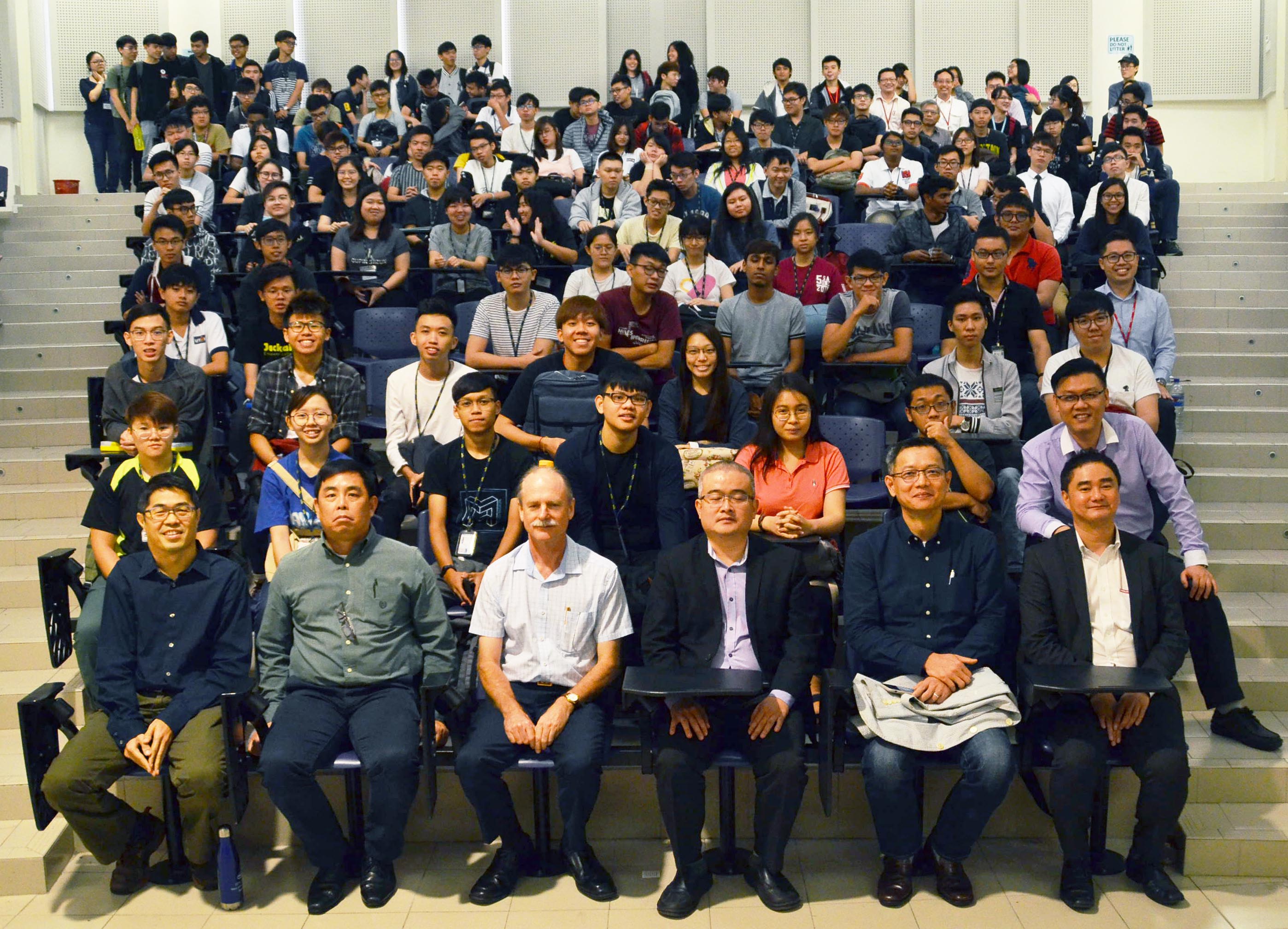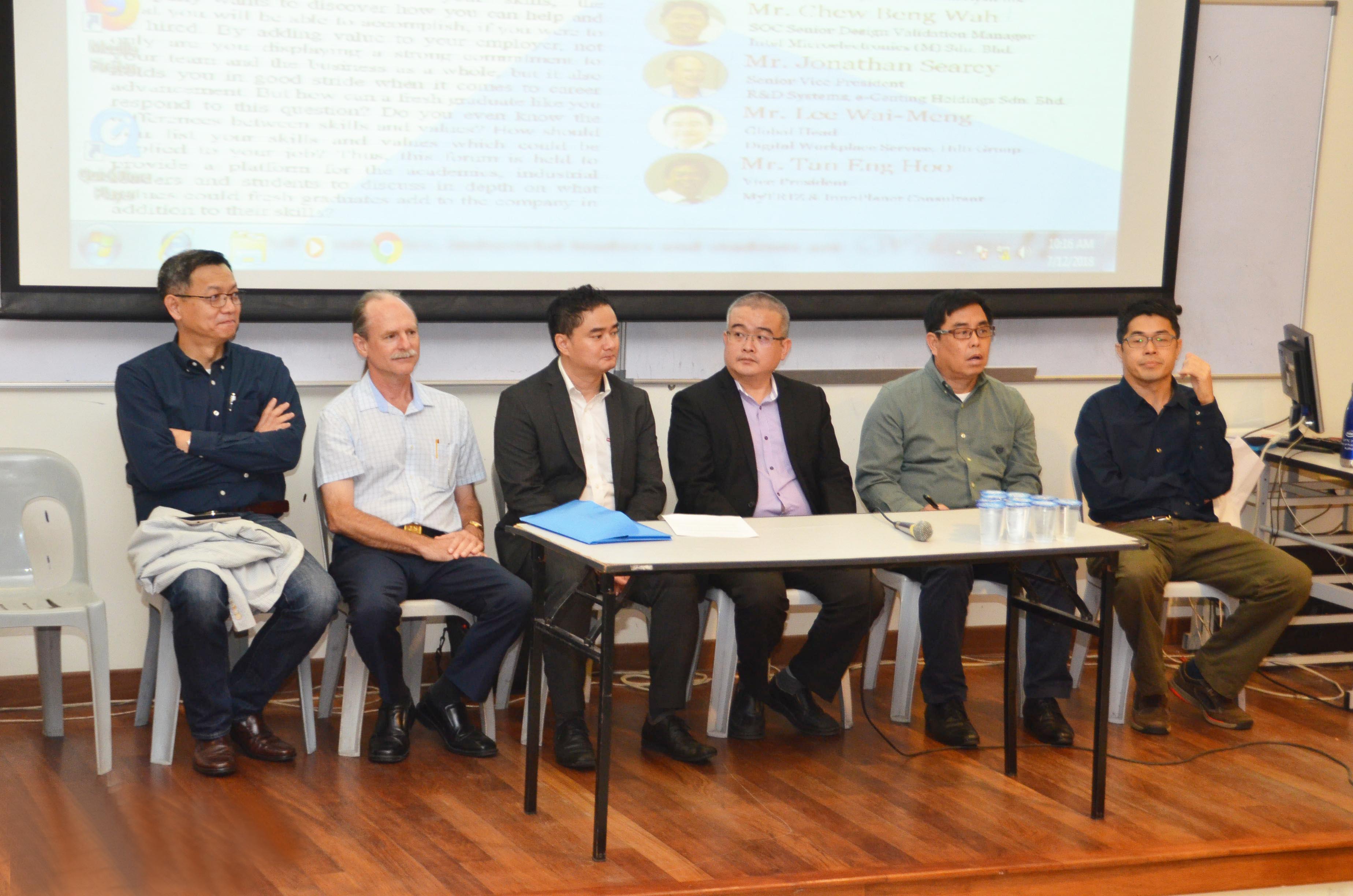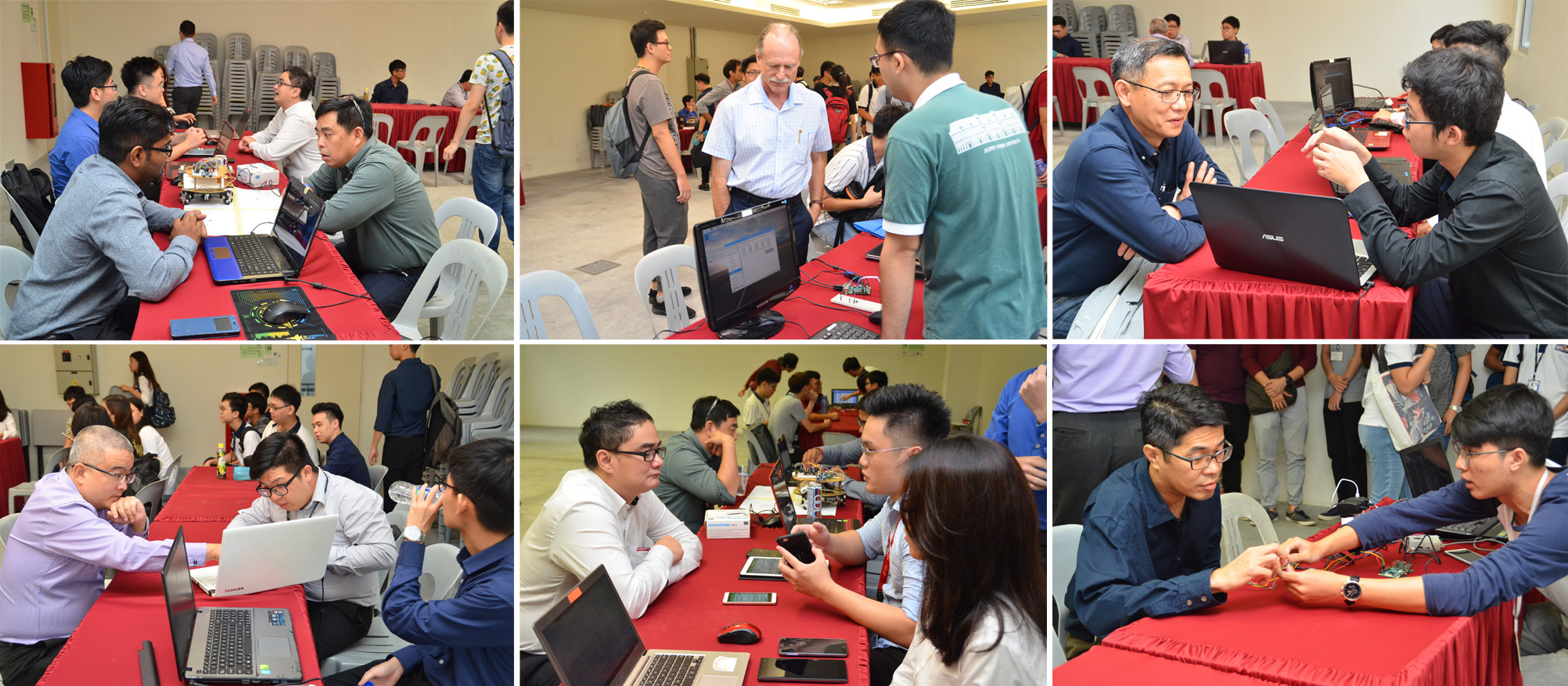

The panellists posing with participants after the forum
The Faculty of Information and Communication Technology (FICT) organised its Industry Advisory Panel (IAP) forum titled “As a fresh graduate, what values could you add to the company, in addition to your skills?”, on 12 July 2018 at Kampar Campus.
The panellists present at the forum were Recogine Technology and EV-Dynamic Senior Consultant Dr Kwong Kae Hsiang, INTEL Microelectronics (M) Sdn Bhd System on Chip (SOC) Senior Design Validation Manager Chew Beng Wah, E-Genting Holdings Sdn Bhd Senior Vice President of the R&D Systems Department Jonathan Searcy, MyTRIZ Vice President and InnoPlanet Consultant Tan Eng Hoo, Hitachi Sunway Information Systems Director Cheah Kok Hoong and Managing Director Head of IT Asia, Hilti Lee Wai-Meng. Also present at the forum was FICT Deputy Dean for Academic Development and Undergraduate Programmes-cum-Organising Chairperson Dr Cheng Wai Khuen, along with staff and students.
This year’s forum acknowledged the importance of fresh graduates to add value to their company, which will essentially help them to stand out among other candidates. At the forum, participants also understood that having value-added capabilities in the career would display their strong commitment to the company and will help them advance their career. Therefore, the forum aimed to provide a platform for academics, industrial leaders and students to discuss in depth on what values fresh graduates could add to the company in addition to their skills.
To understand how value-added capabilities could benefit one’s career, the panellists were first invited to give a self-introduction, which meant to provide the participants with some insights on how to add value to their current skills and enhance their capabilities.
Dr Kwong explained that his job requires him to find a suitable technology for the development of a certain project. Hence, he needs to understand what the customers need. According to him, understanding a customer’s need is important because it would help him find the right technology for that customer’s project.
Cheah, who was a Computer Science graduate, shared his working experience and mentioned that he has learnt more and better at work compared to when he was studying at the university. He told the participants that one of the ways that employees could add value to their companies is to work hard and be bold to realise their dreams. The remaining panellists also shared their working experiences and some gave similar insights shared by Cheah and Dr Kwong.
Further into the forum, the panellists were asked to share their opinions on the difference between values and skills. “In very simple terms, skills are from the brain, which we can learn and apply, while values are projected from the heart. Value is like a belief or a principle that we have when we are doing something. For example, a value is an initiative taken by an individual to not only complete the task assigned but to also take an effort to improve what was done or to do it better,” said Dr Kwong.
According to Cheah, “Skill is like science and is something not perceived, whereas value is related to our feelings; an attitude we project when solving problems. Take example, when dealing with a customer, your friendly attitude and good communication will make the customer value the services you have provided, meaning you have also added value to enhance your customer’s experience.”
Chew said, “Values guide your behaviour and actions. To understand this better, allow me to say that if you do not value yourself and self-improvement, then your skills will be useless.” Searcy mentioned that one important value at work is honesty. “Be truthful in your tasks. When you design a product, make sure that it really works with no hidden defects. If you have discovered a problem, be honest about it and fix it,” advised Searcy.
Lee spoke of skills as something that can be paid to learn, but values are gained from experiences and environment. “There is a difference between a happy customer and an enthusiastic customer. A happy customer will give you a one-off business, but an enthusiastic customer will bring repeated businesses. Your skills can make a customer happy, but the values you apply in your skills will create an enthusiastic customer,” advised Lee.
Tan shared six important values that should be remembered at work. “The six values I learnt from my personal experiences are result orientation, customer orientation, quality products, risk-taking, good working environment, discipline and teamwork. Skills will get you the job, but values will get you further,” said Tan.
In a debate whether skills are more important than values, or vice versa, the panellists agreed that both are correlated and are interdependent. Some also mentioned that they would want to see graduates be curious, courageous, dare to challenge and be a strategic thinker. They also shared some interview advice to the participants. “Be bold to ask questions during an interview session but make sure you ask the right questions, be confident when you speak and be sincere. Have self-motivation and come prepared for the interview. At least understand the position you are applying for and do a little study about your potential employer. Show them you are eager to work in their company,” advised the panellists.
The forum ended with a souvenir presentation by Dr Cheng to all the panellists.

Panellists of the forum (from left) Cheah, Searcy, Lee, Dr Kwong, Tan and Chew

Students interacting with the Industry Advisors
© 2019 UNIVERSITI TUNKU ABDUL RAHMAN DU012(A).
Wholly owned by UTAR Education Foundation Co. No. 578227-M LEGAL STATEMENT TERM OF USAGE PRIVACY NOTICE